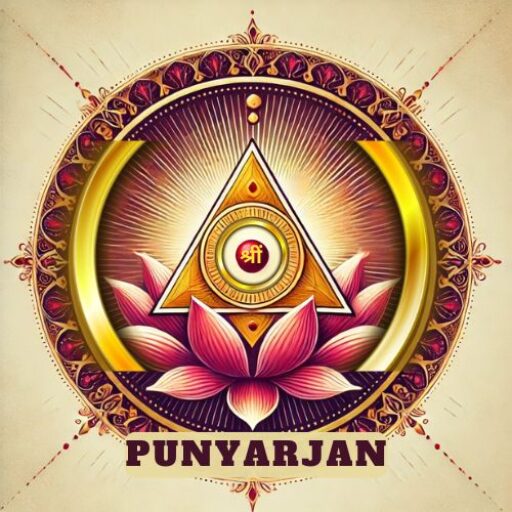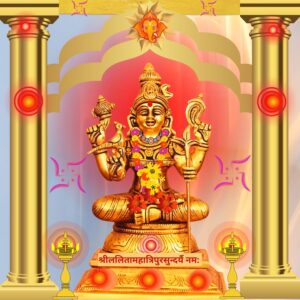
Embrace the Eternal Path of Shrividya

Embrace the Eternal Path of Shrividya
श्रीविद्याचिन्तन Understanding ShriVidya - 1
श्रीविद्या क्या है What is ShriVidya ?

A common question that arises in the minds of Sadhakas is: What is ShriVidya? To explore the concept of ShriVidya, we will delve into ShriLalita Sahasranama stotra.
Shri Lalita Sahasranama consists of a thousand names of Goddess ShriLalita, each describing various attributes of the Goddess. Among these names, four prominent ones are described in ShriLalita Sahasranam Shloka number 269 which says-
आत्मविद्या महाविद्या श्रीविद्या कामसेविता।
श्रीषोडशाक्षरीविद्या त्रिकूटा कामकोटिका।।
Four names in the first line are – Atma Vidya, Mahavidya, ShriVidya, and Kamsevita.
We begin our discussion by with the name ShriVidya and delve into its meaning and significance.
The name ShriVidya is composed of two words: Shri and Vidya. Vidya is a mantra whose presiding Deity is female or a Goddess. Vidya prefixed with Shri becomes ShriVidya meaning the Vidya that describes Brahman. This is expressed in the 727th name, Shivajnana Swaroopini, which means ‘the embodiment of the knowledge of Shiva’ or ‘the one who bestows the knowledge of Shiva’. Here Shiva means the auspicious one ie. Brahman.
Further Vidya is of four types as per Vishnu Puran –
यज्ञविद्या महाविद्या गुह्यविद्या च शोभने।
आत्मविद्या च देवि त्वं विमुक्तिफलदायिनी।।
These are :
Yajna Vidya -The Vidya about Actions (कर्मकाण्ड)
Maha Vidya – Devotion to deities ( उपासना)
Guhya vidya – Deals with secret science of Mantras and (मन्त्र साधना)
Atma vidya – The science of Brahman (मुक्तिप्रदायिनी आत्मविद्या)
Shri Vidya is in all these forms.
It has been mentioned previouisly that AtmVidya or Self Knowledge talks about Brahman the Supreme reality that is why it has been Called Mahavbidya in this Shloka in ShriLalita Sahasrtanam.
ShriVidya mantra is also known as Panchadashi (Fifteen Lettered) mantra having three Kutas which has been explained in depth in Nityashodashikarnava and Varivasya Rahasya.
Let us now discuss the term Trikoota (त्रिकूटा) in this Shloka.The name Trikoota here stands for three groups(कूट) of ShriVidya mantra or Panchdashi Mantra. It has three groups(कूट) of Beejaksharas namely Vaagbhava, Madhya or Kamraj and Shakti Kootas.
These Kootas have been described from 85 to 87 names in Shri Lalitasahasranama.The Vaagbhava Koota has 05 beejas or syllables which is worshipped as the Lotus face of the divine form of Shridevi.The name which describes the first Koota reads as – श्रीमद्वाग्भवकूटैकस्वरूपमुखपंकजा. This name has been prefixed with “Sreemad” because it provides knowledge (ज्ञान) to the sadhaka.
The second or the middle Koota is known as Kamraj Koota having 06 syllables and is the portion from neck to waist of the divine form. This describes the wishes and desires hence it is Icchashakti.
The third Koota known as Shaktikoota forms the portion below waist and has four syllables.It provides all the energies such as creation etc. hence is termed as Kriya Shakti.
Let us understand the name त्रिकूटा in detail. In fact this name indicates a very important aspect of ShriDevi or ShriVidya. In simple words the name means – One who has groups of letters in ‘Threes’. Similoar example is Pranava (ॐ) which has three groups of letters A, U and M respectively indicating to Three Gods performing the tasks of Creation, Protection and Destruction.
We have already discuussed Icchha,Jnana and Kriya.
Other examples of three groups are – Three worlds Bhu, BhuvaH and SvaH,Three forms of Body Physical, Subtle and Casual, Three states of Soul Jagrat, Swapna and Sushupti ( Awaken, Dream and Deep sleep), Three Qualities Satva,Rajas and Tamas etc.
This name establishes that ShriDevi (श्रीविद्या) is in he form of all that in the groups of Three.
Another important name in the Shloka is ShreeshodashakshariVidya (श्रीषोडषाक्षरीविद्या). The simple meaning of this name is One who is in the form of a mantra with 16 syllables.
The Trishati emphasizes that the mantra should only be learned from a qualified Guru, stating: ‘राज्यं देयं, शिरो देयं, न देया षोडशाक्षरी’ — meaning, one may give away a kingdom or even one’s head, but never the Shodashakshari mantra
Following the Shastra Maryada (Scriptural discipline) we are not giving detailed explanation of this name.
